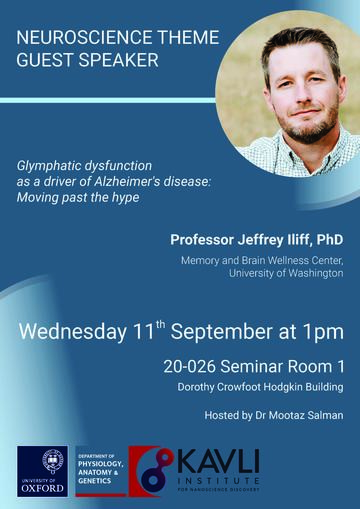Glymphatic Dysfunction as a Driver of Alzheimer’s Disease: Moving Past the Hype
Date: 11 September 2024, 13:00 (Wednesday, 21st week, Trinity 2024)
Location: DCHB 20-026 Seminar Room 1
Speaker: Professor Jeffrey Iliff (University of Washington)
Host: Dr Mootaz Salman (DPAG, University of Oxford)
Booking: Not required
Audience: Members of the University only

The glymphatic system was initially described in rodents twelve years ago as a brain-wide network of perivascular pathways along which the cerebrospinal fluid surrounding the brain exchanges with the brain’s interstitial fluid, supporting the clearance of solutes and wastes including amyloid beta and tau. Reported to be active primarily during sleep, this model provided a compelling explanation for the restorative effects of sleep on cognition, and for the clinical association between aging, brain injury, and sleep disruption and Alzheimer’s disease. Driven primarily by studies in rodents whose translational relevance to human disease is uncertain, and buffeted by mechanistic, technical and personal controversy, belief in the central role of this biology in the pathogenesis of Alzheimer’s disease has frequently outpaced the data causally linking them, leading some in the field to view the science surrounding the glymphatic system as hype and sensationalism. In this presentation, we will clearly define what is known about sleep-active glymphatic function, and evaluate the data that support the role that its dysfunction plays in the development and progression of Alzheimer’s disease. We will then present emerging data from human studies demonstrating a clear role for sleep-active glymphatic function in the clearance of amyloid beta and tau from the human brain. We will conclude by discussing how these findings may provide a pathway towards the primary prevention of Alzheimer’s disease.